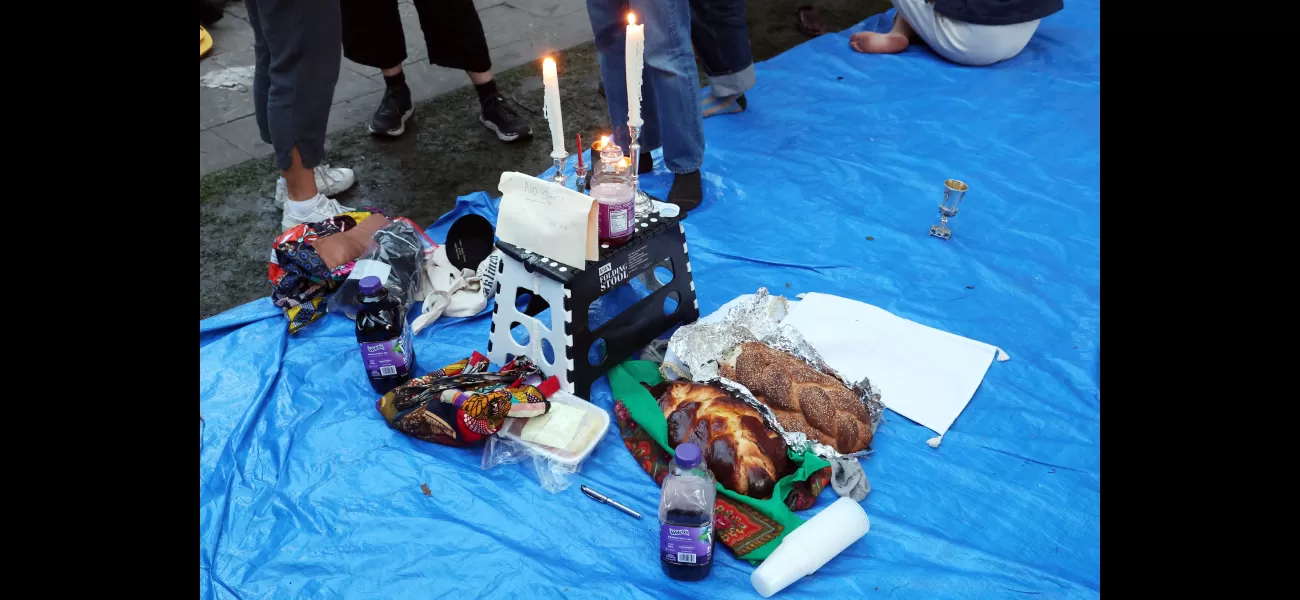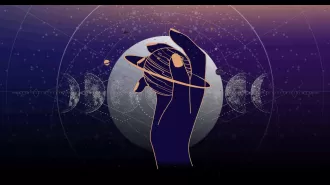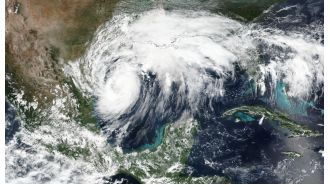Jewish activists at U. of C. camp explain the meaning behind their anti-Zionist Shabbat service.
Jewish protesters against Zionism at UChicago use food, ritual and community in their encampment to voice their opinions.
May 5th 2024.

As the day drew to a close on a tense Friday filled with protests, counterprotests, and a heightened police presence on the University of Chicago's Main Quadrangle, the Jewish holy day of Sabbath began. The sun slowly set over the encampment established by the University of Chicago United for Palestine coalition, where around 50 Jewish students, faculty, and community members gathered on a blue tarp among tents and kaffiyehs for a planned prayer service.
In a powerful display of solidarity, one challah was adorned with a Palestinian flag made out of seeds and herbs, while the ceremonial "wine" was carefully selected to ensure it was not produced in Israel. Handmade posters protesting genocide and Palestinian flags were hung from the trees, creating a poignant backdrop for the service. As the group prayed, other students, many of whom were Muslim, held up kaffiyehs, jean shirts, and checkered blankets to provide privacy.
This gathering, which has been ongoing since April 29, is just one of the ways that Jewish anti-Zionist protesters at the Hyde Park campus are expressing their religious commitment to divestment from Israel, a diverse future, and an end to the violence in Gaza. Along with participating in traditional religious practices like Seders and Shabbats, the group also incorporates non-Israeli kosher products, educational lessons on the pluralistic elements of Jewish traditions, and shared meals with Muslim and other coalition members.
Avi Steinberg, a writer and faculty member who spoke at the event, described Shabbat as a time for reflection and a chance to pause and contemplate our thoughts and emotions. "It's a time to stop the clock completely," he explained in a phone interview the following day.
After the prayer and singing concluded, the Shabbat observers, a small yet significant portion of the encampment, dispersed. Meanwhile, at the central food tent, several unflipped maqluba pots, filled with rice and meat, sat alongside cold chopped salads and hot lentil soup. These dishes, generously donated by the Arab restaurant Al Bahaar, served as an informal Shabbat meal for the encampment's residents. The food tent staff works tirelessly to provide a variety of vegan, kosher, halal, and allergen-free options for everyone.
Soon after, the Muslim maghrib prayer was held on the same blue tarp. The University of Chicago United for Palestine coalition includes Students for Justice in Palestine, UChicago Jews for a Free Palestine, and several other organizations. Nationally, similar encampments have faced accusations of anti-Semitism. However, upon speaking with several Jewish students and affiliated faculty members who are part of the pro-Palestine encampment at U. of C., none of them reported experiencing any form of anti-Semitism within the camp.
Instead, they expressed feeling a deeper connection to their Jewish heritage through their activism during the protests. They believe that their anti-Zionism and advocacy for Palestinian freedom are rooted in a long tradition of Jewish values, including pluralism and fighting for justice. "To me, praying for peace and human emancipation is the essence of being Jewish," shared graduate student Daniel Fernandez, who has been attending and sometimes leading religious services at the encampment.
Despite feeling isolated from campus Jewish groups, UChicago Jews for a Free Palestine have organized several religious events since the encampment was set up. According to messages exchanged with a Jewish organizer at DePaul's encampment, a similar Shabbat service was held within their encampment as well. These events have garnered support from community members, including retired researcher Sandy Perpignani, who sat outside the U. of C. encampment and engaged in conversations with curious onlookers. At Shabbat time, she joined the students and organizers to pray with them.
Although the organizers face personal challenges, they remain focused on the oppression and bravery of the Palestinian people. They are calling on the university to divest from Israel and to demand a cease-fire. Within the Divinity School, Aviva Waldman, a writing instructor and alum who serves as a liaison for organizing students, shared about a Passover event held by the encampment organizers and their allies. This event embodied their commitment to divesting from Israel, supporting Palestinians, and embracing interreligious pluralism.
During Passover, which ended last week, Jewish communities refrain from consuming chametz and instead eat matzo. While most encampment members support the Boycott, Divestment, Sanctions movement, they were faced with a dilemma as many matzo brands, including Manischewitz, produce their goods in Israel. Despite Manischewitz not being officially part of the BDS boycott list, the organizers felt they needed to make a change. Unable to find non-Israeli matzo in Chicago, they ordered it from a specialty farm in New York. In addition, encampment resident Sofia Butnaru even cooked matzo ball soup for Passover using a matzo meal that was not produced in Israel.
Despite facing opposition from some campus Jewish organizations, the encampment continues to thrive and provide a space for Israel-critical Jewish students, who often feel they do not have a religious home on campus. "We felt like we weren't represented in other spaces, so we were really interested in building our own rituals and coming together as like-minded people to practice our religious beliefs that are very dear to us," explained Butnaru. Chicago Jewish leaders held a news conference earlier this week, where they claimed that the encampments were platforms for anti-Semitism. However, many encampment residents and allies, including Callie Maidhof, a professor of global studies, disagree and argue that the encampment's focus is on advocating for Palestinian freedom and justice.
It had been a tense day on the University of Chicago's Main Quadrangle. Protests, counterprotests, and an increased police presence had filled the air with tension. As the sun began to set on Friday evening, the start of the Jewish Sabbath, the atmosphere shifted. Among the encampment set up by the University of Chicago United for Palestine coalition, a group of about 50 Jewish students, faculty, and community members gathered on a blue tarp surrounded by tents and kaffiyehs for a planned prayer service.
The challah, a traditional Jewish bread, was adorned with a Palestinian flag made of seeds and herbs. The ceremonial "wine" was carefully chosen to ensure it was not made in Israel. Palestinian flags and handmade posters denouncing genocide hung from the trees. As they prayed, other students, many of them Muslim, held up kaffiyehs, jean shirts, and checkered blankets to provide privacy for the worshippers.
For weeks now, Jewish protesters at the Hyde Park campus have used food, rituals, and community as a way to express their religious commitment to divesting from Israel and advocating for a multiethnic future and an end to violence in Gaza. This has included observing traditional Jewish holidays, such as Passover and the Sabbath, with non-Israeli kosher products, as well as sharing meals with Muslim and other coalition members.
Avi Steinberg, a writer and faculty member who spoke at the event, described the Sabbath as a time for reflection and introspection. He explained that during this time, people often pause to contemplate their thoughts and emotions, bringing the clock to a complete stop.
After the prayer and singing ended, the group dispersed, and some headed to the central food tent. There, they found a variety of hot and cold dishes, including maqluba, a traditional Palestinian dish, donated by a local Arab restaurant. This meal served as an informal Sabbath dinner, and the food tent staff made sure to provide a variety of options, including vegan, kosher, halal, and allergen-free dishes.
Soon after, the Muslim maghrib prayer began on the same blue tarp. The University of Chicago United for Palestine coalition includes various student organizations, including Students for Justice in Palestine and UChicago Jews for a Free Palestine. Nationally, similar encampments have faced accusations of antisemitism, but in interviews, Jewish students and faculty members within the UChicago encampment expressed feeling more connected to their religion through their activism rather than facing any form of antisemitism.
However, some Jewish leaders in Chicago held a news conference to denounce the encampment as a platform for antisemitism. The university's major Jewish organizations have also distanced themselves from the protesters. In an email, Rabbi Yossi Brackman of Rohr Chabad at the University of Chicago stated that there will always be a minority who hold opposing views, and this situation is no different.
Members of the encampment, such as graduate student Sofia Butnaru, have expressed feeling isolated from campus Jewish groups and have found a sense of community with like-minded individuals within the encampment. They have organized religious events, such as the Sabbath service, and have even collaborated with other encampments, such as the one at DePaul University.
Despite facing personal challenges, the organizers have remained focused on their main goal: advocating for Palestinian freedom and calling for the university to divest from Israel and support a ceasefire. Within the Divinity School, Aviva Waldman, a writing instructor, and alum acts as a faculty liaison for the organizing students. She described a Passover event that reflected their commitment to divestment, support for Palestinians, and acceptance of religious diversity.
During Passover, which had recently ended, Jewish communities typically avoid eating chametz, or leavened bread, and instead consume matzo. However, many popular matzo brands produce their goods in Israel, which goes against the organizers' beliefs. As a result, they ordered matzo from a specialty farm in New York to use in their Passover celebrations. They also made sure to use non-Israeli matzo meal in traditional dishes, such as matzo ball soup.
Despite facing criticism and pushback, the encampment continues to stand strong in their beliefs and their efforts to promote justice and freedom for Palestinians. They have created a space for themselves within the university, where they can observe their religious traditions and use their activism to make a difference in the world.
In a powerful display of solidarity, one challah was adorned with a Palestinian flag made out of seeds and herbs, while the ceremonial "wine" was carefully selected to ensure it was not produced in Israel. Handmade posters protesting genocide and Palestinian flags were hung from the trees, creating a poignant backdrop for the service. As the group prayed, other students, many of whom were Muslim, held up kaffiyehs, jean shirts, and checkered blankets to provide privacy.
This gathering, which has been ongoing since April 29, is just one of the ways that Jewish anti-Zionist protesters at the Hyde Park campus are expressing their religious commitment to divestment from Israel, a diverse future, and an end to the violence in Gaza. Along with participating in traditional religious practices like Seders and Shabbats, the group also incorporates non-Israeli kosher products, educational lessons on the pluralistic elements of Jewish traditions, and shared meals with Muslim and other coalition members.
Avi Steinberg, a writer and faculty member who spoke at the event, described Shabbat as a time for reflection and a chance to pause and contemplate our thoughts and emotions. "It's a time to stop the clock completely," he explained in a phone interview the following day.
After the prayer and singing concluded, the Shabbat observers, a small yet significant portion of the encampment, dispersed. Meanwhile, at the central food tent, several unflipped maqluba pots, filled with rice and meat, sat alongside cold chopped salads and hot lentil soup. These dishes, generously donated by the Arab restaurant Al Bahaar, served as an informal Shabbat meal for the encampment's residents. The food tent staff works tirelessly to provide a variety of vegan, kosher, halal, and allergen-free options for everyone.
Soon after, the Muslim maghrib prayer was held on the same blue tarp. The University of Chicago United for Palestine coalition includes Students for Justice in Palestine, UChicago Jews for a Free Palestine, and several other organizations. Nationally, similar encampments have faced accusations of anti-Semitism. However, upon speaking with several Jewish students and affiliated faculty members who are part of the pro-Palestine encampment at U. of C., none of them reported experiencing any form of anti-Semitism within the camp.
Instead, they expressed feeling a deeper connection to their Jewish heritage through their activism during the protests. They believe that their anti-Zionism and advocacy for Palestinian freedom are rooted in a long tradition of Jewish values, including pluralism and fighting for justice. "To me, praying for peace and human emancipation is the essence of being Jewish," shared graduate student Daniel Fernandez, who has been attending and sometimes leading religious services at the encampment.
Despite feeling isolated from campus Jewish groups, UChicago Jews for a Free Palestine have organized several religious events since the encampment was set up. According to messages exchanged with a Jewish organizer at DePaul's encampment, a similar Shabbat service was held within their encampment as well. These events have garnered support from community members, including retired researcher Sandy Perpignani, who sat outside the U. of C. encampment and engaged in conversations with curious onlookers. At Shabbat time, she joined the students and organizers to pray with them.
Although the organizers face personal challenges, they remain focused on the oppression and bravery of the Palestinian people. They are calling on the university to divest from Israel and to demand a cease-fire. Within the Divinity School, Aviva Waldman, a writing instructor and alum who serves as a liaison for organizing students, shared about a Passover event held by the encampment organizers and their allies. This event embodied their commitment to divesting from Israel, supporting Palestinians, and embracing interreligious pluralism.
During Passover, which ended last week, Jewish communities refrain from consuming chametz and instead eat matzo. While most encampment members support the Boycott, Divestment, Sanctions movement, they were faced with a dilemma as many matzo brands, including Manischewitz, produce their goods in Israel. Despite Manischewitz not being officially part of the BDS boycott list, the organizers felt they needed to make a change. Unable to find non-Israeli matzo in Chicago, they ordered it from a specialty farm in New York. In addition, encampment resident Sofia Butnaru even cooked matzo ball soup for Passover using a matzo meal that was not produced in Israel.
Despite facing opposition from some campus Jewish organizations, the encampment continues to thrive and provide a space for Israel-critical Jewish students, who often feel they do not have a religious home on campus. "We felt like we weren't represented in other spaces, so we were really interested in building our own rituals and coming together as like-minded people to practice our religious beliefs that are very dear to us," explained Butnaru. Chicago Jewish leaders held a news conference earlier this week, where they claimed that the encampments were platforms for anti-Semitism. However, many encampment residents and allies, including Callie Maidhof, a professor of global studies, disagree and argue that the encampment's focus is on advocating for Palestinian freedom and justice.
It had been a tense day on the University of Chicago's Main Quadrangle. Protests, counterprotests, and an increased police presence had filled the air with tension. As the sun began to set on Friday evening, the start of the Jewish Sabbath, the atmosphere shifted. Among the encampment set up by the University of Chicago United for Palestine coalition, a group of about 50 Jewish students, faculty, and community members gathered on a blue tarp surrounded by tents and kaffiyehs for a planned prayer service.
The challah, a traditional Jewish bread, was adorned with a Palestinian flag made of seeds and herbs. The ceremonial "wine" was carefully chosen to ensure it was not made in Israel. Palestinian flags and handmade posters denouncing genocide hung from the trees. As they prayed, other students, many of them Muslim, held up kaffiyehs, jean shirts, and checkered blankets to provide privacy for the worshippers.
For weeks now, Jewish protesters at the Hyde Park campus have used food, rituals, and community as a way to express their religious commitment to divesting from Israel and advocating for a multiethnic future and an end to violence in Gaza. This has included observing traditional Jewish holidays, such as Passover and the Sabbath, with non-Israeli kosher products, as well as sharing meals with Muslim and other coalition members.
Avi Steinberg, a writer and faculty member who spoke at the event, described the Sabbath as a time for reflection and introspection. He explained that during this time, people often pause to contemplate their thoughts and emotions, bringing the clock to a complete stop.
After the prayer and singing ended, the group dispersed, and some headed to the central food tent. There, they found a variety of hot and cold dishes, including maqluba, a traditional Palestinian dish, donated by a local Arab restaurant. This meal served as an informal Sabbath dinner, and the food tent staff made sure to provide a variety of options, including vegan, kosher, halal, and allergen-free dishes.
Soon after, the Muslim maghrib prayer began on the same blue tarp. The University of Chicago United for Palestine coalition includes various student organizations, including Students for Justice in Palestine and UChicago Jews for a Free Palestine. Nationally, similar encampments have faced accusations of antisemitism, but in interviews, Jewish students and faculty members within the UChicago encampment expressed feeling more connected to their religion through their activism rather than facing any form of antisemitism.
However, some Jewish leaders in Chicago held a news conference to denounce the encampment as a platform for antisemitism. The university's major Jewish organizations have also distanced themselves from the protesters. In an email, Rabbi Yossi Brackman of Rohr Chabad at the University of Chicago stated that there will always be a minority who hold opposing views, and this situation is no different.
Members of the encampment, such as graduate student Sofia Butnaru, have expressed feeling isolated from campus Jewish groups and have found a sense of community with like-minded individuals within the encampment. They have organized religious events, such as the Sabbath service, and have even collaborated with other encampments, such as the one at DePaul University.
Despite facing personal challenges, the organizers have remained focused on their main goal: advocating for Palestinian freedom and calling for the university to divest from Israel and support a ceasefire. Within the Divinity School, Aviva Waldman, a writing instructor, and alum acts as a faculty liaison for the organizing students. She described a Passover event that reflected their commitment to divestment, support for Palestinians, and acceptance of religious diversity.
During Passover, which had recently ended, Jewish communities typically avoid eating chametz, or leavened bread, and instead consume matzo. However, many popular matzo brands produce their goods in Israel, which goes against the organizers' beliefs. As a result, they ordered matzo from a specialty farm in New York to use in their Passover celebrations. They also made sure to use non-Israeli matzo meal in traditional dishes, such as matzo ball soup.
Despite facing criticism and pushback, the encampment continues to stand strong in their beliefs and their efforts to promote justice and freedom for Palestinians. They have created a space for themselves within the university, where they can observe their religious traditions and use their activism to make a difference in the world.
[This article has been trending online recently and has been generated with AI. Your feed is customized.]
[Generative AI is experimental.]
0
0
Submit Comment





